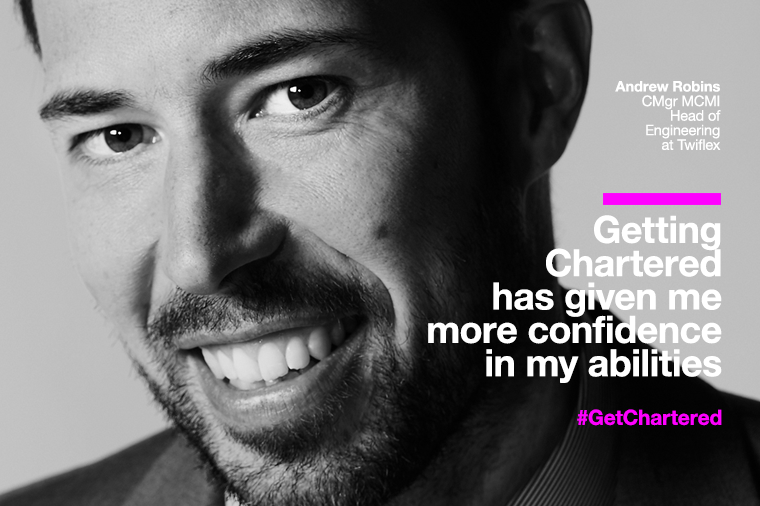Meet The Chartered Manager: The engineer turned manager

Professional Manager spoke to Andrew Robins to hear about his journey to Chartered Status, and how CMI has helped him in his career
Matt ScottAt some point in your career, you’ll be propelled into a position where you feel uncomfortable, even out of your depth. For Andrew Robins, that moment was when he suddenly became a manager, with no prior experience, after his boss left his engineering company, Twiflex, leaving him suddenly responsible for managing seven engineers.
Robins never planned on becoming a manager so early in his career – but, having always set his eyes on becoming a Chartered Engineer, he’s always seen the merits of Chartered status.
Fortunately, when Robins first stepped up to his management position, the company gave him the support he needed to make the transition. Twiflex provided Robins with mentoring to help his move into management and also sent him on management courses to equip him with the necessary skills.
“That support was fundamental, and something that all new managers need,” says Robins. “I was a bit of a fish out of water to start off with. It was quite a difficult time when I took on the role – we’d just gone through a consolidation, so it was almost like being in a new company, and I had to recruit my own team. It was quite a steep learning curve.”
Robins started his career in engineering as a mechanical craft apprentice, before completing an HNC and an HND during a 10-year stint with Bedford-based Twiflex, the specialist in advanced braking technology that’s part of the US giant Altra Industrial Motion. Robins did have time away from Twiflex – at Allianz Engineering, where he completed a BEng Honours Degree in his spare time. Robins then returned as a mechanical design engineer and achieved his ambition of becoming a Chartered Engineer.
It was his work with the Institute of Engineering and Technology (IET) that sparked him to become a Chartered Manager.
The IET and CMI work in partnership to encourage qualified engineers to gain Chartered Manager status, and Robins was the 100th person to take that step with IET.
“The process got me thinking about my achievements over the previous four or five years and the competencies that I’d demonstrated,” he says. “The interview [with CMI] was quite challenging, and some of the questions put me on the spot, but it was a positive experience and I felt a sense of achievement having gone through it. There was a big section on reflecting on your career to date and where you want to go in the future; that was quite a key moment for me.”
Thinking about the direction he wanted his career to go in ultimately led to Robins embarking on an MBA, which his employer has sponsored as a result of his Chartered Manager award. Becoming Chartered also helped build Robins’s confidence for his new and evolving managerial role. Having access to CMI resources sparked Robins to implement new operational and performance management initiatives at Twiflex.
Four years ago, he introduced a new visual-management system. It was the first time Twiflex had used KPIs to monitor the engineering performance of his department.
So, would Robins recommend Chartered Manager to others? “If you’re serious about management and want to demonstrate you’re working at a professional standard, I would encourage you to join,” he says.
Read more stories of fantastic Chartered Managers and hear Robins’s story in his own words, here

Press & Media Enquiries
For more information or to request interviews, contact CMI's Press Team on 020 7421 2705 or email press.office@managers.org.uk


